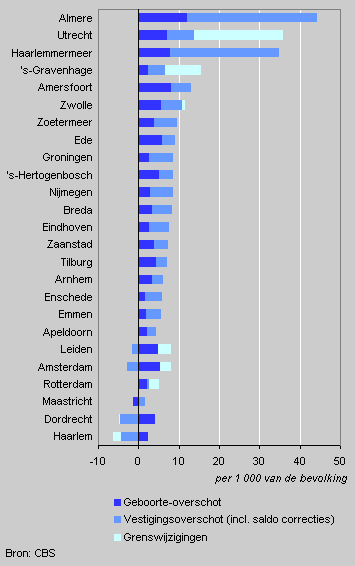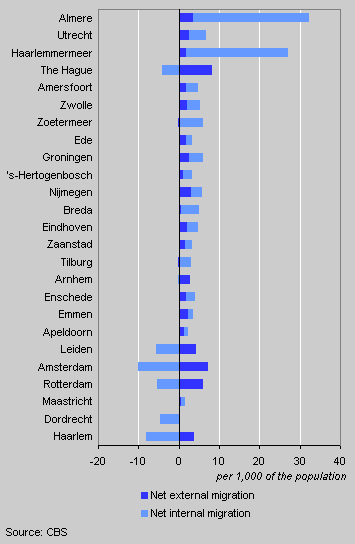Population grows faster in large municipalities

The population of the 25 largest Dutch municipalities grew by 1 percent annually between 2000 and 2003. The annual growth rate for smaller municipalities was more than 0.4 percent, i.e. less than half the rate for large municipalities.
The relatively high growth rate in the largest municipalities is chiefly a consequence of the migration surplus due to foreign migration. Border corrections also contribute to the growth of the population. If border corrections are not taken into account, the growth rate would have been 0.8 percent for large municipalities and 0.5 percent for small municipalities.
Population growth in the 25 largest municipalities 2000/2003

High growth rate for Almere, Utrecht and Haarlemmermeer
Almere has the highest annual population growth rate among the large municipalities (almost 4.5 percent) in the period 2000–2003.This was mainly because net migration was high as a consequence of domestic migration (almost 3 percent).
Utrecht is runner-up with an annual growth rate of 3.6 percent. Border corrections largely account for this result. Excluding border corrections Utrecht would have realised an annual growth of 1.4 percent.
The growth rate in Haarlemmermeer is also high at 3.5 percent. Here, too, the migration surplus is, to a large extent, caused by domestic migration (2.5 percent).
Net migration in the 25 largest municipalities, 2000/2003

Population dwindling in Dordrecht and Haarlem
The number of inhabitants fell in the municipalities of Dordrecht and Haarlem. In Haarlem the population fell by almost 0.2 percent annually in the period 2000–2003, in Dordrecht by less than 0.1 percent. The dwindling population in these municipalities is mainly caused by domestic migration.
Mortality rate exceeds birth rate in Maastricht
Leiden, Amsterdam and The Hague also have a negative domestic migration balance, amply counterbalanced by a positive foreign net migration. Maastricht is unique among the large municipalities for having a negative excess of births. In Maastricht deaths outnumbered births in the period 2000–2003.
Ron Tas